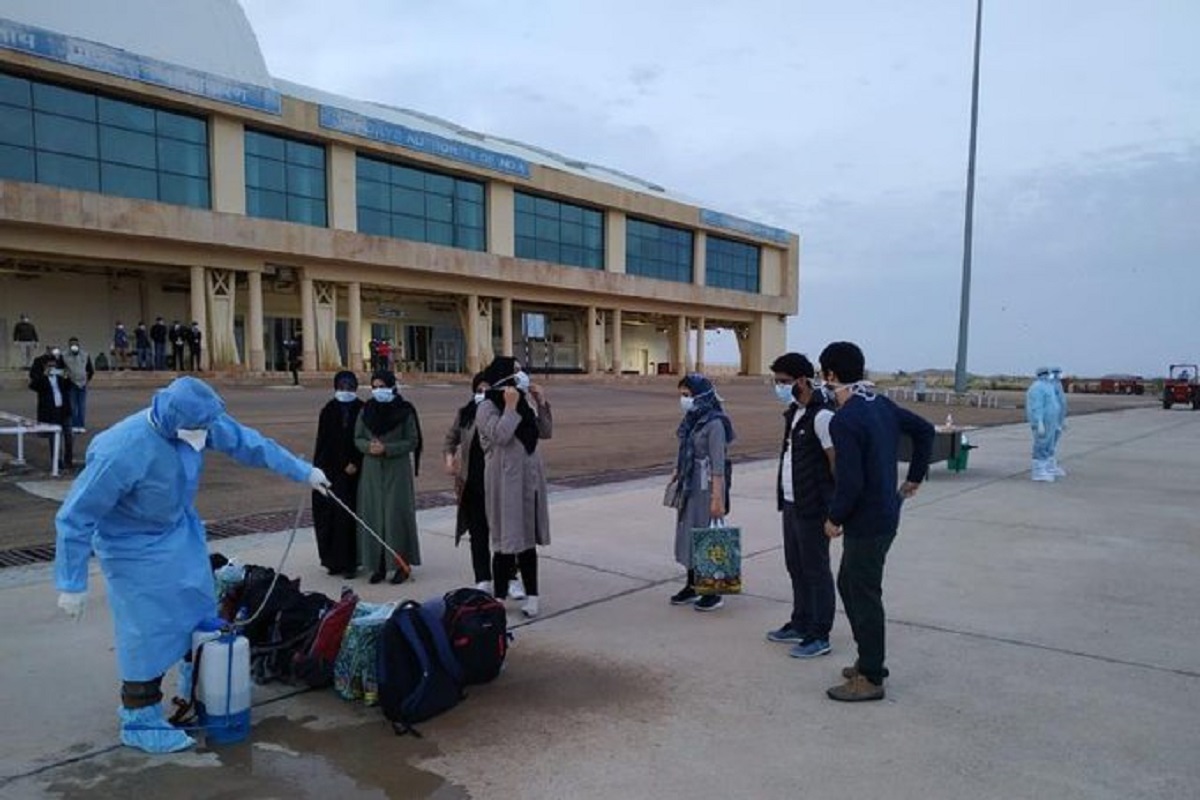US firms can use Gold Cards to recruit Indians: Trump
The "Gold Card" unveiled by President Trump on Wednesday offers US Citizenship to wealthy foreign nationals provided they are willing to invest USD 5 million.
Remember ‘Patient 31’ – the lady in South Korea who transmitted the virus to more than 1,100 people in Daegu and Seoul as she went about her normal life. Countries such as Singapore, Japan hailed a fortnight ago as “role models” for India to fight Covid-19 with a ‘normal’ life are declaring emergencies. Lockdowns are to buy time for hospitals to gear up capacity. Until a vaccine is found to prevent Covid-19, no one in any country is safe.

(Image: Twitter/@JAMMULINKS)
No curfew-like lockdown in the USA despite 22,000 dead and the world’s only superpower is seeing for the first time the horror of mass graves. US President Donald Trump has blood on his hands, and he does not know it. Restaurants are open in the USA, in Trump’s country prioritising saving the economy over saving lives from Covid-19. Lockdowns, it must be remembered, only pause not stop the spread of the SARS-Cov-2 virus causing the Covid-19 pandemic.
Remember ‘Patient 31’ – the lady in South Korea who transmitted the virus to more than 1,100 people in Daegu and Seoul as she went about her normal life. Countries such as Singapore, Japan hailed a fortnight ago as “role models” for India to fight Covid-19 with a ‘normal’ life are declaring emergencies. Lockdowns are to buy time for hospitals to gear up capacity. Until a vaccine is found to prevent Covid-19, no one in any country is safe.
Advertisement
Decisions have to be taken balancing realities with the risks. India faces a different threat of the only solution to the crisis which is causing a crisis: food availability to millions during the unavoidably extended lockdown. Chief Ministers, parliamentarians and politicians are well-fed and live comfortably even during these times.
Advertisement
We do not grudge them that, and may they be happy. But act with the urgency required as you would if your family is suffering. Being aware of a problem is different from experiencing that problem. It can make the difference when making decisions to save lives. These are tough times for presidents, prime ministers, chief ministers.
They face a ‘damned if you do and likewise if you don’t’ quandary. Extend the lockdown and get slammed by those wanting livelihoods and the economy resurrected. Lift the lockdown and get cursed if thousands die. Through all the Covid-19-related confusion spreading as a parallel pandemic, one fact emerges clear: without a vaccine, social distancing is the only way to stop the spread of the SARS-Cov-2 virus.
Social distancing to work needs a curfew-like lockdown – not the wishywashy versions outrageously continuing in the USA and UK despite both countries together suffering more than 32,000 Covid-19 deaths. But the curfew- like lockdown works only if people have access to food and essentials, at least rice, wheat and lentils if not vegetables.
Shortages increase with wholesale markets shut down due to vendors testing coronavirus-positive, as has happened in Mumbai. “It is becoming increasingly difficult to get supplies”, a partner in a fair price shop told me. “We have to arrange our own transport”. Farmers are forced to throw away tonnes of vegetables due to lack of transport.
“Cost of transport has become more expensive than profits”, said a farmer in Maharasthra. Transport and delivery of essential commodities need prime ministerial monitoring – daily. Availability of food nationwide is crucial to an extended lockdown succeeding. Supply- distribution needs efforts on war footing. Prime Minister Narendra Modi accurately declared this is a world war against a virus.
To fight a war needs an army – and India cannot win the coronavirus war without its army. Other countries such as the USA and UK are using their defence forces on a much larger scale for Covid-19 relief than India. India’s armed forces are habitual saviours during natural disasters and climatic calamities, but have a bigger role in the health-socioeconomic calamity of Covid-19. I had recommended in The Statesman of 29 March that army assistance is crucial to maintaining supply chains of essential commodities and medical supplies across the country.
The urgency of supply-chain logistics becomes necessary as transporters struggle with workers’ shortage. Other problems include no food enroute with dhabas (highway eateries) shut. Using the transportation power and manpower of the armed forces becomes unavoidable to break the logjam of poor co-ordination between state governments. Lakhs of supply trucks are stuck at state border checkpoints.
As during major wars, fighting this coronavirus-war needs armyescorted convoys of trucks carrying essentials, with field kitchens for truck drivers. Trucks can also be used as mobile grocery shops in residential localities. Pre-packed bags worth Rs 100, Rs 500 and Rs 1000 of essential groceries can be quickly sold to residents to avoid long queues. These are times needing selfless service of the soldier, not profiteering of the trader.
The soldier’s courage too is needed, since transport workers keep away fearing Covid-19. We are in for a long haul. The abnormal life of these times will continue until a Covid-19 vaccine is found. To survive these days of uncertainty needs governmental leaders focussing on two core priorities: food for all and personal protective equipment for everyone in essential services. This needs utilising the full power of India’s defence forces during this Covid-19 war: most essentially the supply-delivery chain of essential commodities.
(The writer is a senior, Mumbai-based journalist)
Advertisement